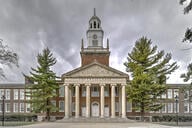You have /5 articles left.
Sign up for a free account or log in.
WASHINGTON -- The U.S. Department of Education on Tuesday, for the first time, named most of the hundreds of colleges whose federal aid it has restricted because of concerns about their finances or compliance with federal requirements.
The department released a partial list of the nearly 560 institutions that, as of March 1, were subject to the financial restrictions known as heightened cash monitoring. Most of the colleges -- 487 institutions -- were on the lower level of scrutiny, and 69 were subject to the higher, more stringent restrictions.
“We feel that by issuing this list today we’re doing what’s right for good government and transparency’s sake,” said Ted Mitchell, the under secretary of education.
The department continued to keep secret the identities of 21 of the 69 colleges that it placed on the highest level of monitoring, which means that department employees manually approve every dollar that flows to an institution. Nearly all of those unidentified colleges were on that status because a federal audit of the institution resulted in “severe findings.”
“We have ongoing investigations at each of those institutions and we fear that, at this point, releasing those names would impede the progress of our investigation,” Mitchell said in an interview. He said the names of those colleges would eventually be released as the investigations are completed. seems like this should say "investigations are complete" -- not a single investigation, is it? dl ** ok, changed to make clear multiple investigations and that they will release as individual investigations end, not all investigations end. /ms
‘A Caution Light’
Mitchell said that colleges may be placed on either form of cash monitoring for a range of reasons, some of which are more serious than others.
The department, for example, may impose the sanction on a college for submitting its financial statements late. That appears to have been the case for 43 public colleges and universities in Minnesota, all of which were on cash monitoring with the designation of “audit late/missing.”
At the other extreme, a college may land on cash monitoring because of serious concerns about its financial viability. Roxbury Community College, in Massachusetts, for instance, is on cash monitoring because of concerns about its "administrative capacity." The college released a report in 2013 that showed, among other things, that administrators had lost track of significant amounts of money.
A college being on the list “is not necessarily a red flag to students and taxpayers, but it can serve as a caution light,” Mitchell wrote in a blog post. “It means we are watching these institutions more closely to ensure that institutions are using federal student aid in a way that is accountable to both students and taxpayers.”
New Transparency Step
Before releasing the names of the institutions on cash monitoring Tuesday, the department had fought to keep the information secret. As recently as last week, the department said that disclosing the list was likely to result in a “substantial competitive injury” for colleges operating in a competitive marketplace.
The department reversed its position late last week after Inside Higher Ed reported that the cash monitoring information was largely being kept hidden from public view.
When Inside Higher Ed first requested the cash monitoring list last summer, the department denied the request and claimed that it did not keep such a list.
Going forward the department plans to publish the cash monitoring list online and update it on an ongoing basis, but it hasn’t yet decided how frequently, Mitchell said.
Varying Levels of Scrutiny
Many of the colleges on the lower level of monitoring, which typically places a several-day delay on colleges’ federal funding, are placed there automatically because they fail the department’s standards of financial responsibility.
Colleges and the groups that represent them have long complained that the methodology of those scores is out of date and doesn’t accurately reflect an institution’s financial health.
"A lot of financially healthy institutions can find themselves on HCM1, for any number of minor reasons," said Terry Hartle, senior vice president for government and public affairs at the American Council on Education. "HCM2 is a more serious problem, and institutions that are on there probably merit a close look."
Hartle said that although the department is rightly trying to make sure colleges have the financial and administrative capacity to receive federal funding, officials have not been clear about how they use the cash monitoring sanctions.
"What institutions do to end up in that circumstance is not always clear," he said. "Because they're now making it public, the stakes are much higher, and the need for more disclosure and transparency by the department has increased."
For-Profits Dominate List
For-profit colleges made up more than half of the institutions on each level of heightened cash monitoring.
Of the 487 colleges facing the lower level of scrutiny, mostly for failing the department’s financial responsibility test, 290 were for-profit institutions. Similarly, for-profit institutions represented 39 of 69 colleges facing the more stringent restrictions.
Many smaller for-profit beauty, barber and cosmetology schools faced the highest level of monitoring, for a variety of reasons, including accreditation problems, high default rates and severe audit findings.
Large for-profit college chains also have some colleges on the list, such as Corinthian Colleges, ITT Educational Services, Education Management Corporation, and Career Education Corporation, including several of its Le Cordon Bleu campuses that are up for sale. Those publicly-traded companies had all previously disclosed their status to investors. (An earlier version of this paragraph incorrectly suggested that only some of these companies had told investors of their cash monitoring status.)
Noah Black, a spokesman for the Association of Private Sector Colleges and Universities, said in response to the department’s release of the list that students "would benefit greatly not from another disclosure, but from clear, direct and accurate information."
He pointed to the “wealth of information that currently exists” on the department’s website, including various data points about colleges and universities that are collected and published by the government.
Trace Urdan, a senior analyst at Wells Fargo who focuses on for-profit education companies, said in a note to clients that the public disclosure of the list wouldn’t have a huge impact on stock prices. But, he said, the list “could have the effect of discouraging enrollment at named institutions, thereby exacerbating their enrollment challenges.”
He also said that there is “a strong likelihood that state regulators could demand disclosure of the sanction to prospective students, and/or impose their own sanctions on named schools.”
Institutions on Heightened Cash Monitoring 2:
|
Name |
City, State |
Type |
Reason |
|
Arkansas Baptist College
|
Little Rock, Ark. |
Private, Nonprofit |
Administrative Capability |
|
JRMC School of Nursing |
Pine Bluff, Ark. |
Private, Nonprofit |
Audit -- Severe Findings |
|
Asian-American International Beauty College |
Westminster, Calif. |
Proprietary |
Accreditation Problems |
|
David's Academy of Beauty |
Pico Rivera, Calif. |
Proprietary |
Accreditation Problems |
|
Community Christian College |
Redlands, Calif. |
Private, Nonprofit |
Accreditation Problems |
|
Galaxy Medical College |
North Hollywood, Calif. |
Proprietary |
Accreditation Problems |
|
Southern California University SOMA |
Los Angeles, Calif. |
Proprietary |
Accreditation Problems |
|
Real Barbers College (The) |
Anaheim, Calif. |
Proprietary |
Accreditation Problems |
|
California Career School |
Anaheim, Calif. |
Proprietary |
Audit Late/Missing |
|
American Beauty College |
West Covina, Calif. |
Proprietary |
Other -- CIO Problems (Eligibility) |
|
Potomac College |
Washington, D.C. |
Proprietary |
Administrative Capability |
|
SAE Institute of Technology -- Miami |
North Miami Beach, Fla. |
Proprietary |
Administrative Capability |
|
Ultrasound Medical Institute |
Lantana, Fla. |
Proprietary |
Audit Late/Missing |
|
Academy of Healing Arts, Massage & Facial Skin Care |
Lake Worth, Fla. |
Proprietary |
Other -- CIO Problems (Eligibility) |
|
Atlanta Beauty & Barber Academy |
Doraville, Ga. |
Proprietary |
Accreditation Problems |
|
American College of Hairstyling -- Cedar Rapids |
Cedar Rapids, Iowa |
Proprietary |
Audit Late/Missing |
|
American College of Hairstyling -- Des Moines |
Des Moines |
Proprietary |
Audit Late/Missing |
|
Larry's Barber College |
Chicago |
Proprietary |
Audit Late/Missing |
|
Masters of Cosmetology College |
Fort Wayne, Ind. |
Proprietary |
Administrative Capability |
|
Collins School of Cosmetology |
Middlesboro, Ky. |
Proprietary |
Accreditation Problems |
|
Roxbury Community College |
Boston |
Public |
Administrative Capability |
|
International Beauty School |
Cumberland, Md. |
Proprietary |
Accreditation Problems |
|
Sojourner-Douglass College |
Baltimore |
Private, Nonprofit |
Accreditation Problems |
|
Missouri School of Barbering & Hairstyling -- St. Louis |
Florissant, Mo. |
Proprietary |
Audit Late/Missing |
|
eClips School of Cosmetology and Barbering |
Cape Girardeau, Mo. |
Proprietary |
Default Rate |
|
Fort Berthold Community College |
New Town, N.D. |
Public |
Payment Method Changed |
|
Little Priest Tribal College |
Winnebago, Neb. |
Private, Nonprofit |
Administrative Capability |
|
Total Image Beauty Academy |
Union City, N.J. |
Proprietary |
Financial Responsibility |
|
Bramson ORT College |
Forest Hills, N.Y. |
Private, Nonprofit |
Accreditation Problems |
|
Rabbinical Seminary of America |
Flushing, N.Y. |
Private, Nonprofit |
Audit Late/Missing |
|
Joffrey Ballet School, American Ballet Center |
New York, N.Y. |
Proprietary |
Audit Late/Missing |
|
Yeshiva Shaar Hatorah |
Richmond Hill, N.Y. |
Private, Nonprofit |
F/S Late/Missing |
|
Saint James Mercy Hospital School of Radiologic Sciences |
Hornell, N.Y. |
Private, Nonprofit |
Financial Responsibility |
|
VEEB Nassau County School of Practical Nursing |
Uniondale, N.Y. |
Public |
Financial Responsibility |
|
Ohio Mid-Western College |
Cincinnati |
Private, Nonprofit |
Financial Responsibility |
|
Institute of Therapeutic Massage |
Lima, Ohio |
Proprietary |
Outstanding Liability/Offset |
|
CC's Cosmetology College |
Tulsa, Okla. |
Proprietary |
Program Review |
|
Citizens School of Nursing |
New Kensington, Penn. |
Private, Nonprofit |
Other -- CIO Problems (Eligibility) |
|
Western Pennsylvania Hospital School of Nursing |
Pittsburgh |
Private, Nonprofit |
Other -- CIO Problems (Eligibility) |
|
Nashville Barber and Style Academy |
Nashville |
Proprietary |
Administrative Capability |
|
Shear Academy |
Crossville, Tenn. |
Proprietary |
Audit -- Severe Findings |
|
Texas Beauty College |
Haltom City, Tex. |
Proprietary |
Accreditation Problems |
(The department declined to name an additional 21 colleges that were subject to heightened cash monitoring 2.)




